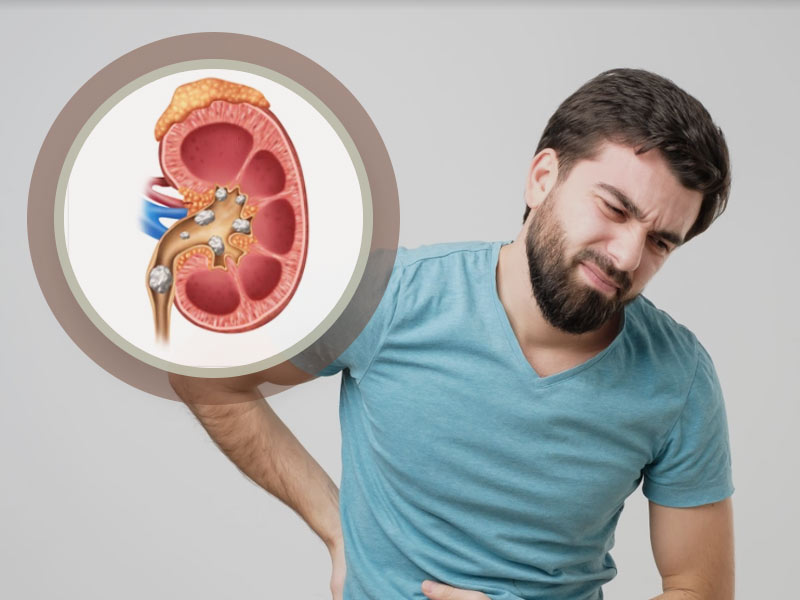
Kidney stones, medically known as renal calculi, nephrolithiasis, or urolithiasis, are a prevalent concern affecting individuals of various ages and genders. However, men in their 40s are particularly susceptible to developing kidney stones due to a variety of factors. Understanding the symptoms associated with kidney stones in this demographic is crucial for early detection and effective management.
Table of Content:-
We spoke to our expert Dr Shrey Srivastav, (MBBS, MD), General Physician - Sharda Hospital to elucidate more on the causes, risk factors, symptoms, prevention and management of kidney stones in men in their 40s. Here is what he shared with us.
Causes and Risk Factors of Kidney Stones
Kidney stones form when minerals and salts in the urine crystallise and clump together to form solid masses. Several factors contribute to the formation of kidney stones, including diet, excess body weight, certain medical conditions, and medications. In men in their 40s, the risk of developing kidney stones is heightened due to physiological changes and lifestyle factors.
Kidney Stones Symptoms in Men
Recognising the symptoms of kidney stones is essential for prompt medical intervention. Men in their 40s experiencing kidney stones may present with the following symptoms:
1. Severe, Sharp Pain
Intense pain in the side and back below the ribs is a hallmark symptom of kidney stones. The pain can be debilitating and may radiate to the lower abdomen and groyne area.

Also Read: Expert Shares 6 Health Benefits of Drinking Fennel Tea
2. Fluctuating Pain
The pain associated with kidney stones often comes in waves and varies in intensity. This fluctuation in pain levels can significantly impact daily activities and quality of life.
3. Painful Urination
Individuals may experience a burning sensation or pain while urinating, indicating the presence of kidney stones irritating the urinary tract.
4. Blood in Urine
Hematuria, characterised by the presence of blood in the urine, is a common symptom of kidney stones. The urine may appear pink, red, or brown, indicating internal bleeding caused by the passage of stones.
Additional Symptoms
Other signs and symptoms of kidney stones in men in their 40s may include cloudy or foul-smelling urine, frequent urination in small amounts, nausea, vomiting, fever, chills (if an infection is present), and restless legs.

Prevention and Management
While kidney stones can be painful and disruptive, several preventive measures can reduce the risk of their formation. Men in their 40s can adopt the following strategies to prevent kidney stones:
1. Hydration
Adequate fluid intake is crucial for maintaining urinary tract health and preventing the concentration of minerals in the urine. Men should aim to drink plenty of water throughout the day to stay hydrated.
Also Read: World Down Syndrome Day 2024: 10 Tips for Caregiving Parents
2. Balanced Diet
Following a balanced diet low in oxalate and sodium can help minimise the risk of kidney stone formation. Foods rich in calcium, such as dairy products, should be consumed in moderation, while foods high in oxalates, such as spinach and nuts, should be limited.
3. Regular Exercise
Engaging in regular physical activity can help maintain a healthy weight and reduce the risk of obesity, a significant risk factor for kidney stones.
4. Medical Evaluation
Men in their 40s experiencing symptoms suggestive of kidney stones should seek prompt medical evaluation. A healthcare professional can conduct diagnostic tests, such as urine analysis and imaging studies, to confirm the presence of kidney stones and determine the appropriate course of treatment.
5. Medication and Lifestyle Modifications
Depending on the size and composition of the kidney stones, treatment may involve pain management, medications to facilitate stone passage, or surgical intervention. Lifestyle modifications, including dietary changes and medication adherence, are essential components of long-term management.
A Final Word
"Kidney stones can pose significant health challenges for men in their 40s, impacting their quality of life and overall well-being. By recognising the symptoms associated with kidney stones and adopting preventive measures, individuals can reduce their risk of stone formation and minimise the likelihood of complications. Early detection and prompt medical intervention are essential for effectively managing kidney stones and preventing recurrence. If you or someone you know is experiencing symptoms suggestive of kidney stones, seek medical attention promptly for proper evaluation and treatment," Dr Srivastav concluded.
Also watch this video
How we keep this article up to date:
We work with experts and keep a close eye on the latest in health and wellness. Whenever there is a new research or helpful information, we update our articles with accurate and useful advice.
Current Version